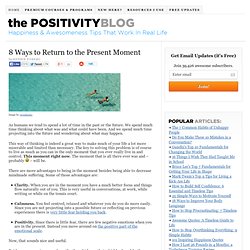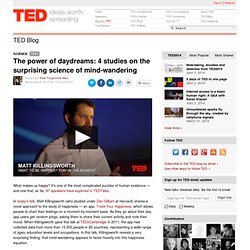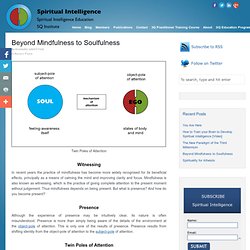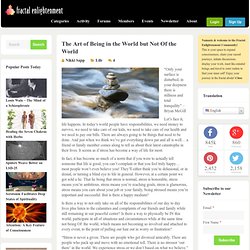

Cookies are Not Accepted - New York Times. The brain’s long-term memory has often been compared to an archive, but that’s not its primary purpose.

Instead of faithfully recording the past, it keeps rewriting history. Life Before 30» Blog Archive » Discover Your Authentic Self and Live the Life You Really Want With This Little Method. For all the various questions I get from readers of my blog, from “How do I land my dream job?”

And “How can I network with confidence?” Does Mind-Wandering Make You Less Caring? Where is your attention right now?

Humans are thought to spend many of our waking hours not in the present moment. What’s more, we are rarely even aware of the fact that our minds have wandered. Past studies have suggested that mind-wandering has negative effects on our mood and even our physical health. In a recently published study in the Journal of Positive Psychology, my colleagues and I sought to understand whether mind-wandering also makes us less caring—and what we can do about it. Mindfulness—the unconventional research of psychologist Ellen Langer.
In 1981, early in her career at Harvard, Ellen Langer and her colleagues piled two groups of men in their seventies and eighties into vans, drove them two hours north to a sprawling old monastery in New Hampshire, and dropped them off 22 years earlier, in 1959.

The group who went first stayed for one week and were asked to pretend they were young men, once again living in the 1950s. The second group, who arrived the week afterward, were told to stay in the present and simply reminisce about that era. Mindfulness: How to Call Off the Emotional Attack Dogs. The Art of Now: Six Steps to Living in the Moment. A friend was walking in the desert when he found the telephone to God. The setting was Burning Man, an electronic arts and music festival for which 50,000 people descend on Black Rock City, Nevada, for eight days of "radical self-expression"—dancing, socializing, meditating, and debauchery. A phone booth in the middle of the desert with a sign that said "Talk to God" was a surreal sight even at Burning Man. The idea was that you picked up the phone, and God—or someone claiming to be God—would be at the other end to ease your pain. So when God came on the line asking how he could help, my friend was ready.
"How can I live more in the moment? " "Breathe," replied a soothing male voice. My friend flinched at the tired new-age mantra, then reminded himself to keep an open mind. "Whenever you feel anxious about your future or your past, just breathe," continued God. 8 Ways to Return to the Present Moment. Image by visualpanic.

As humans we tend to spend a lot of time in the past or the future. We spend much time thinking about what was and what could have been. And we spend much time projecting into the future and wondering about what may happen. This way of thinking is indeed a great way to make much of your life a lot more miserable and limited than necessary. The key to solving this problem is of course to live as much as you can in the only moment that you ever really live in and control. Use Neuroscience to Remain Calm Under Pressure. 12 Indispensable Mindful Living Tools. 4 studies on the surprising science of mind-wandering. What makes us happy?

It’s one of the most complicated puzzles of human existence — and one that, so far, 87 speakers have explored in TEDTalks. In today’s talk, Matt Killingsworth (who studied under Dan Gilbert at Harvard) shares a novel approach to the study of happiness — an app, Track Your Happiness, which allows people to chart their feelings on a moment-by-moment basis. As they go about their day, app users get random pings, asking them to share their current activity and note their mood. When Killingsworth gave this talk at TEDxCambridge in 2011, the app had collected data from more than 15,000 people in 80 countries, representing a wide range of ages, education levels and occupations. Mind Wandering: A New Personal Intelligence Perspective. Some recent studies (Baird et al., 2011, 2012; Smallwood et al., 2011b; Immordino-Yang etal., 2012) have provided glimpses of how mind wandering or “constructive, internal reflection” (Immordino-Yangetal.,2012) might benefit the individual, but we are just beginning to scratch the surface.

To gain a fuller understanding of the benefits of positive constructive daydreaming we need to apply tools and metrics (as in Klinger et al., 1980; Hoelscher et al., 1981; Nikles et al., 1998; Cox and Klinger, 2011; Klinger and Cox, 2011) that enable us identify the personally meaningful goals, aspirations, and dreams of individuals and determine how mind wandering supports or undermines those goals. Given the highly personal nature of mind wandering, we need a new focus and new metrics. Intelligence theories provide an interesting parallel. Executive Attention Network To help correct this imbalance in the literature, I recently proposed the Theory of Personal Intelligence.
Default Mode Network. Beyond Mindfulness to Soulfulness — Spiritual Intelligence. Twin Poles of Attention Witnessing In recent years the practice of mindfulness has become more widely recognised for its beneficial effects, principally as a means of calming the mind and improving clarity and focus.

Mindfulness is also known as witnessing, which is the practice of giving complete attention to the present moment without judgement. Thus mindfulness depends on being present. But what is presence? Presence. The Power of the Pause. Do you choose your response or act on impulse?

The Art of Being in the World but Not Of the World. “Only your surface is disturbed; in your deepness there is stillness and total tranquility” – Bryan McGill Let’s face it, life happens.

"You" Don't Exist: Why an Enduring Self Is a Delusion. What if our therapeutic goals of improving self-esteem, developing a stable and coherent sense of self, and identifying and expressing genuine, authentic feelings all turn out to be symptoms of delusion? And what if the current mindfulness craze—if we take it seriously enough—changes who we think we are and what we’re trying to do in therapy? Like atomic energy in the 1960s, mindfulness is lately being seen as the cure for everything. Depression, anxiety, alienation, attention deficit hyperactivity disorder, financial difficulties—you name it and there’s a mindfulness-based remedy for it.
King County Conflict Clinic.